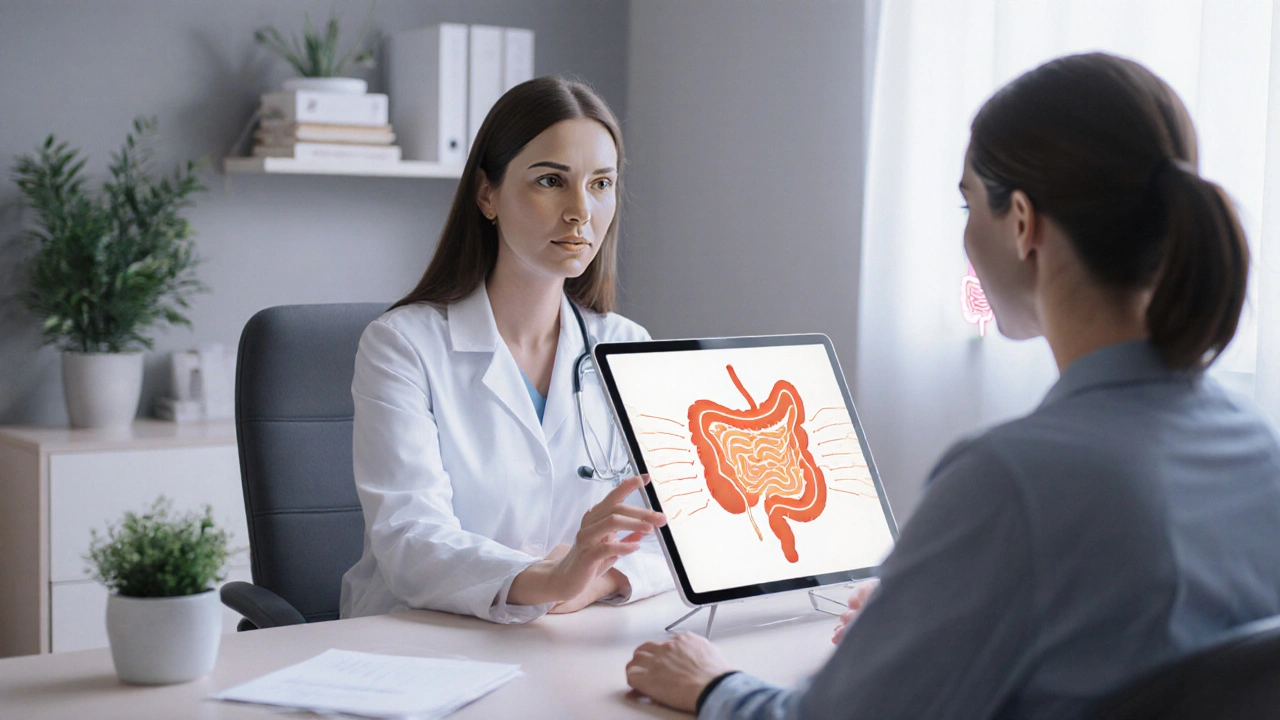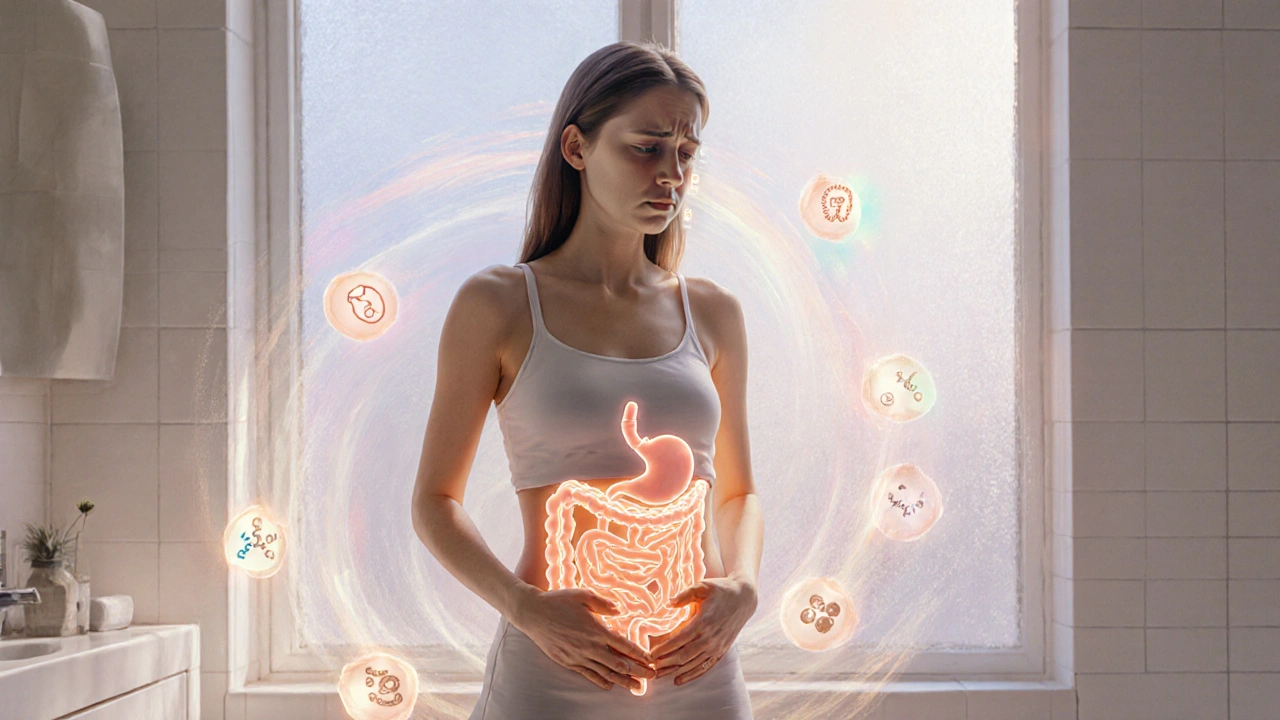Menstrual-related diarrhea is a condition where the digestive tract reacts to the hormonal shifts of the menstrual cycle, often resulting in loose stools, cramping, and urgency. Although many dismiss it as a minor inconvenience, the underlying biology involves a cascade of hormones, prostaglandins, and gut‑motility changes that deserve a clear explanation and sensible management strategies.
Why the Gut Reacts to Your Period
During the luteal phase, the body ramps up production of Progesterone, a hormone that relaxes smooth muscle throughout the body, including the intestines. About 48 hours before menstruation, progesterone levels fall sharply, while Estrogen spikes briefly. This hormonal roller‑coaster triggers the release of Prostaglandins, lipid compounds that contract the uterine lining to shed the endometrium.
Prostaglandins don’t stay confined to the uterus; they travel through the bloodstream and bind to receptors in the colon, increasing peristaltic waves. The result: faster transit time, less water reabsorption, and the classic watery stools that many experience on their period day.
Key Hormonal Players and Their Attributes
- Progesterone: relaxes smooth muscle, peaks in the mid‑luteal phase, drops ~24‑48hrs before menses.
- Estrogen: promotes prostaglandin synthesis, shows a secondary rise just before bleeding.
- Prostaglandin F2α: primary uterine‑contracting prostaglandin, also stimulates colonic muscles.
- Gastrointestinal motility: speed of intestinal content movement; increases by up to 30% during high prostaglandin levels.
Understanding these attributes helps pinpoint which part of the hormonal cascade is most responsible for your symptoms.
Common Triggers That Exacerbate Period Diarrhea
Hormones set the stage, but lifestyle factors often turn a mild upset into a full‑blown episode.
| Trigger | How It Affects the Gut | Typical Onset |
|---|---|---|
| High‑dose NSAIDs (e.g., ibuprofen) | Increase prostaglandin release, worsen cramps and diarrhea | Within 2‑4hrs of ingestion |
| Caffeine & sugary drinks | Stimulate colon, add osmotic load | 30‑60mins after consumption |
| Low‑fiber diet | Reduces stool bulk, accelerates transit | Gradual, noticeable over weeks |
| Stress & sleep loss | Elevates cortisol, disrupts gut‑brain signaling | Same day or next day |
Notice how many triggers overlap with general IBS patterns. If you already have a sensitive gut, the hormonal surge can tip the balance toward diarrhea.

Managing Hormonal Diarrhea Without Disrupting Your Cycle
Below is a step‑by‑step playbook you can start using today.
- Hydrate strategically. Aim for 2‑2.5L of water daily; add electrolytes (sodium, potassium) if you’re losing a lot of fluid.
- Boost soluble fiber. Foods like oats, apples, and carrots form a gel that slows absorption, counteracting rapid transit.
- Limit irritating beverages. Swap coffee for herbal teas (ginger, peppermint) that soothe the colon.
- Use targeted over‑the‑counter meds. A low‑dose antispasmodic (e.g., dicyclomine) taken at the onset of cramps can moderate prostaglandin‑driven motility.
- Consider hormonal birth control. Combined oral contraceptives stabilize estrogen‑progesterone swings, often reducing prostaglandin spikes. Discuss options with a clinician.
- Track your cycle. A simple app or paper log helps you see patterns-if diarrhea consistently appears on day2‑3, you know when to pre‑emptively apply the above steps.
Most of these actions are low‑risk, but if you have underlying conditions (e.g., inflammatory bowel disease), consult your doctor before adding new meds.
When to Seek Professional Care
Occasional loose stools are normal, but certain red flags call for a clinician’s attention:
- Blood or mucus in stool persisting beyond two menstrual cycles.
- Severe dehydration (dizziness, rapid heartbeat, dark urine).
- Unexplained weight loss greater than 5% of body weight.
- Fever, abdominal rigidity, or sudden, severe pain.
These symptoms may indicate infections, pelvic inflammatory disease, or exacerbated IBS, all of which require targeted treatment.
Related Topics You Might Want to Explore Next
Understanding menstrual diarrhea opens the door to a broader view of how reproductive hormones influence overall health. Consider reading about:
- Hormonal acne flare‑ups. Similar prostaglandin pathways affect skin oil production.
- Premenstrual syndrome (PMS) vs. premenstrual dysphoric disorder (PMDD). A deeper dive into mood and brain chemistry shifts.
- Gut‑brain axis during the menstrual cycle. How stress, sleep, and hormones together shape digestion.
Each of these topics expands on the central idea that your period isn’t just a reproductive event-it’s a systemic signal.

Frequently Asked Questions
Why does diarrhea often happen right before my period?
The drop in progesterone and the surge of prostaglandins trigger stronger colonic contractions, speeding up stool passage and reducing water absorption, which makes stools loose.
Can hormonal birth control stop my period diarrhea?
Often, yes. Combined oral contraceptives keep estrogen and progesterone levels steadier, lessening the prostaglandin spike that drives diarrhea. Talk to a healthcare provider to find the right formulation.
Should I avoid ibuprofen if I get diarrhea during my period?
Ibuprofen can increase prostaglandin production, potentially worsening gut symptoms. If you need pain relief, acetaminophen is a gentler alternative for most people.
What foods help calm my gut during menstruation?
Soluble fiber (oats, bananas, apples), low‑fat Greek yogurt (probiotic), ginger tea, and boiled potatoes are all easy on the gut and can reduce rapid transit.
Is it normal to have fever with period‑related diarrhea?
No. Fever suggests an infection or inflammatory condition unrelated to normal hormonal changes, so see a clinician promptly.
Can stress make menstrual diarrhea worse?
Stress raises cortisol, which can heighten gut‑brain signaling and make the colon more sensitive to prostaglandins, amplifying diarrhea.
What over‑the‑counter medication is safest for period cramps without worsening diarrhea?
A low‑dose antispasmodic such as dicyclomine taken at the first sign of cramping can relax the bowel while easing uterine pain. Always check dosing guidelines.






Ajayi samson
September 27, 2025 AT 18:09When progesterone drops the colon speeds up, which explains why many of us get the runs right before period.
What the post glosses over is the impact of diet‑induced microbiome shifts that can amplify prostaglandin‑driven motility.
Low‑fiber meals, high sugar snacks, and even the occasional late‑night caffeine binge all prime the gut for a sprint.
And let’s not pretend NSAIDs are harmless; they push prostaglandin production higher, turning a mild upset into a full‑blown emergency.
Bottom line: you need a holistic plan that tackles hormones, diet, and medication together.
Sadie Bell
October 1, 2025 AT 14:28Stay hydrated and you’ll feel the difference!
Holly Hayes
October 5, 2025 AT 10:46You cant just ignore that this is a real health issue its not some weird myth that only a few suffer from
period diarrhea and it deserves proper respect from anyone who thinks women are overreacting
the hormones do real work on your gut and you should listen to your body not just dismiss it
Anshul Gandhi
October 9, 2025 AT 07:05Let’s be clear the mainstream medical narrative conveniently hides the fact that big pharma pushes ibuprofen as the go‑to painkiller while quietly ignoring natural alternatives that actually calm the gut.
They profit from you suffering the cramps and the diarrhea because every extra pill means another dollar.
If you look at the research you’ll see that low‑dose antispasmodics and dietary tweaks can cut the prostaglandin surge in half, but those aren’t on the headline shelves.
Wake up and demand a protocol that doesn’t line the pockets of pharmaceutical giants.
Emily Wang
October 13, 2025 AT 03:23Don’t wait for the cramps to knock you out-prep your gut the day before your period hits.
Load up on soluble fiber like oatmeal or an apple, swap that morning espresso for ginger tea, and keep a bottle of electrolyte solution within arm’s reach.
If you feel the first hint of cramping, grab a low‑dose antispasmodic and you’ll stop the diarrhea before it starts.
Consistency is key; tracking your cycle for a month will show you exactly when to intervene.
Hayden Kuhtze
October 16, 2025 AT 23:42It’s amusing how often people misuse the term “hormonal” as a catch‑all for any discomfort.
Properly speaking, the drop in progesterone triggers a cascade of prostaglandins, which in turn increase colonic peristalsis.
One would think a simple sentence like “the hormones cause the gut to move faster” would suffice, but alas, we are forced into verbose explanations.
Nevertheless, the science is straightforward, and a modest increase in soluble fiber will mitigate the effect.
Craig Hoffman
October 20, 2025 AT 20:00The gut‑brain axis is the hidden player behind most period‑related GI issues.
When estrogen spikes, it sensitizes the enteric nervous system, making the colon hyper‑responsive.
Prostaglandin F2α then adds fuel by directly stimulating smooth muscle cells in the colon.
This triple hit accelerates transit time and leaves little water for reabsorption, resulting in loose stools.
If you already have a low‑grade IBS‑like sensitivity, the hormonal surge pushes you over the edge.
The good news is that you can blunt this cascade with a few practical steps.
First, keep a food journal for two cycles to spot patterns between specific foods and your symptoms.
Second, aim for at least 25 grams of soluble fiber daily; oats, barley, and psyllium are top choices.
Third, stay well‑hydrated with electrolyte‑balanced fluids, especially if you’re losing volume rapidly.
Fourth, limit caffeine and alcohol in the week leading up to your period because they increase colonic motility.
Fifth, consider a low‑dose antispasmodic such as dicyclomine at the first sign of cramping; it attacks the prostaglandin‑driven muscle spasms without affecting hormone levels.
Sixth, discuss hormonal birth control options with your clinician; a steady estrogen‑progesterone ratio often flattens the prostaglandin surge.
Seventh, practice stress‑reduction techniques like deep breathing or gentle yoga, as cortisol can amplify gut‑brain signaling.
Finally, if any symptom persists beyond two cycles-especially blood, mucus, or severe pain-seek medical evaluation promptly.
By combining diet, hydration, targeted meds, and stress management you can keep period diarrhea from derailing your life.
Terry Duke
October 24, 2025 AT 16:19Hey there, I get that dealing with period diarrhea can feel like a total nightmare, but remember, you’re not alone, and there are simple things you can try, like sipping ginger tea, adding a banana to your breakfast, and keeping a water bottle handy, every little habit adds up, and before you know it you’ll be back on track, keep your chin up!
Chester Bennett
October 28, 2025 AT 11:37It’s important to approach this issue with both empathy and evidence‑based strategies. Monitoring your cycle in a simple spreadsheet can reveal the exact days when symptoms peak, allowing you to pre‑emptively increase fiber intake or schedule an antispasmodic dose. Additionally, a short consultation with a gastroenterologist can rule out underlying conditions such as IBD or infection. By combining diligent tracking with targeted interventions, you can minimize disruption and maintain overall wellbeing.
Debra Cine
November 1, 2025 AT 07:56Thanks for sharing this info! 🌟 It’s great to have a clear checklist to follow each month, and I’m already planning to swap my coffee for peppermint tea on day 1 of my cycle. 😊 If anyone has extra tips or favorite recipes for soothing the gut, feel free to drop them in the comments! 🙌
Illiana Durbin
November 5, 2025 AT 04:14One practical tip that often gets overlooked is the timing of probiotic consumption. Taking a high‑quality, multi‑strain probiotic with your evening meal can help stabilize the gut microbiome just before the hormonal shift occurs. This simple addition may reduce the intensity of prostaglandin‑induced motility and give you a smoother ride through your period.
Tyler Heafner
November 9, 2025 AT 00:32In accordance with current clinical guidelines, patients presenting with menstrual‑related diarrhea should first be evaluated for dehydration and electrolyte imbalance. Subsequent management may include the judicious use of osmotic laxatives or antispasmodic agents, contingent upon individual tolerance and comorbid conditions. It is imperative that any therapeutic regimen be discussed with a qualified healthcare professional to ensure safety and efficacy.
anshu vijaywergiya
November 12, 2025 AT 20:51Imagine the cramps as a thunderstorm and the diarrhea as lightning striking the sky of your gut-both are fierce, but together they can be conquered! By embracing the power of warm ginger broth, a soothing hug of oatmeal, and the steadfast rhythm of breath, you transform turmoil into triumph. Let the rhythm of your cycle become a symphony rather than a cacophony, and watch how quickly the storm passes.
ADam Hargrave
November 16, 2025 AT 17:09Ah, the noble pursuit of a “natural” solution-how very avant‑garde! 🌍 While the global elite peddle pills and profit from your discomfort, a humble cup of ginger tea and a disciplined gut routine can outshine any commercial gimmick. Remember, true strength lies in mastering your own biology, not in bowing to multinational pharma cartels. 🇺🇸💪